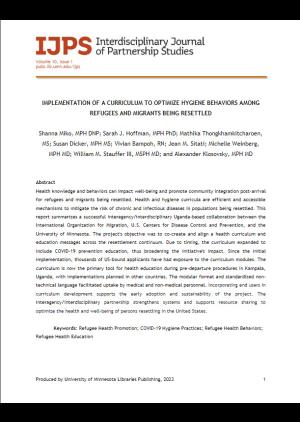Health knowledge and behaviors can impact well-being and promote community integration post-arrival for refugees and migrants being resettled. Health and hygiene curricula are efficient and accessible mechanisms to mitigate the risk of chronic and infectious diseases in populations being resettled. This report summarizes a successful interagency/interdisciplinary Uganda-based collaboration between the International Organization for Migration, U.S. Centers for Disease Control and Prevention, and the University of Minnesota. The project's objective was to co-create and align a health curriculum and education messages across the resettlement continuum. Due to timing, the curriculum expanded to include COVID-19 prevention education, thus broadening the initiative's impact. Since the initial implementation, thousands of US-bound applicants have had exposure to the curriculum modules. The curriculum is now the primary tool for health education during pre-departure procedures in Kampala, Uganda, with implementations planned in other countries. The modular format and standardized non-technical language facilitated uptake by medical and non-medical personnel. Incorporating end users in curriculum development supports the early adoption and sustainability of the project. The interagency/interdisciplinary partnership strengthens systems and supports resource sharing to optimize the health and well-being of persons resettling in the United States.

Implementation of a Curriculum to Optimize Hygiene Behaviors among Refugees and Migrants being Resettled
Author/s: Shanna Miko, Sarah J. Hoffman, Mathika Thongkhamkitcharoen, Susan Dicker, Vivian Bampoh, Jean Sitati, Michelle Weinberg, William Stauffer, Alexander Klosovsky
Year:
Language: English
Publication Type: Scientific Report (Journal)(External)
Download this Publication
Year:
Language: English
Publication Type: Scientific Report (Journal)(External)
Download this Publication
Description
Region/Country (by coverage)
Publisher
Interdisciplinary Journal of Partnership Studies
Project Type